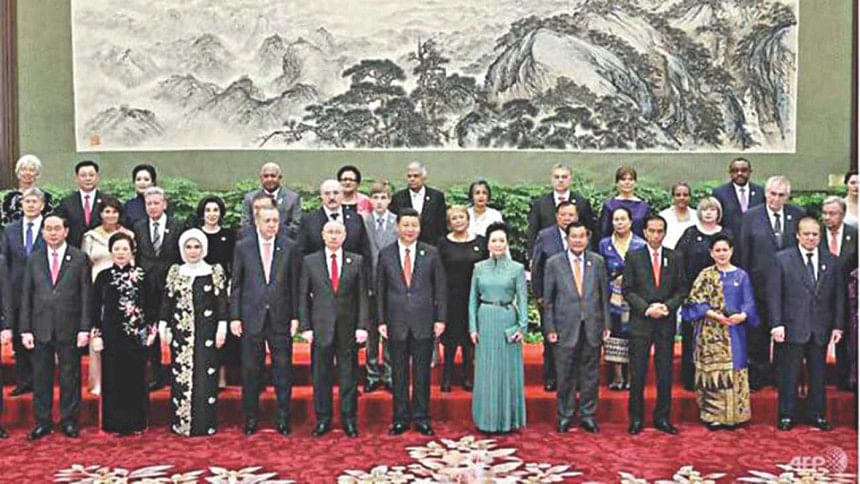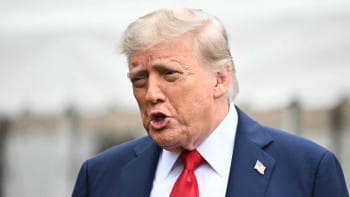How can we benefit from a China-led globalisation?

Even as the US, under President Donald Trump, is withdrawing itself into the cocoon of isolationism, protectionism and ultra-nationalism, China is taking the US' place, supplanting it as the new global leader with a new and broad vision of globalisation. A new global economic order, characterised by regional and international openness and cooperation for a win-win outcome - and not for an outcome where the winner takes all - is emerging under China's initiative. The AIIB, NDB, and regional trade agreements like FTAAP, RCEP, led by China, constitute the wherewithal of that blossoming global economic order. It is the Asia-centric (more precisely China-centric) economic order that is gradually superseding the one founded by the West.
The new order is going to provide a fresh and massive stimulus to the process of globalisation that is now being buffeted by the West, despite the fact that globalisation was their concept and they have been the principal forces behind the extent of globalisation that the world has witnessed so far. The West is now showing protectionist and isolationist proclivities, for they are unable to match the current Asian competitiveness.
Against the backdrop of the fact that anti-globalisation dynamics are now gaining strength in the West, the world is witnessing China's Belt and Road Initiative (BRI), which is truly a China-led Asian drive for a stupendous impetus to globalisation. Paradoxically, the efforts to revitalise globalisation are being led by China, a communist country, against the background of the US' current anti-globalisation economic policies. China is investing billions of dollars bilaterally, as well as through the newly-founded China-led Asian Infrastructure Investment Bank (AIIB) and the Silk Road Fund, in the Belt and Road countries to implement this signature project of President Xi.
The New Silk Road Economic Belt (SREB) will connect China's central and western regions to the huge markets of Eurasia (embodying the ME, Central Asia, West Asia and Europe) and East Africa, and help close the prosperity gap between the eastern and the land-locked western and central regions of China, while the 21st Century Maritime Silk Road will further boost the economic prosperity in the eastern and coastal regions of the country. The Belt and Road would immensely boost trade, investment, physical, digital and other forms of connectivity and cooperation between all the countries of the regions in diverse arenas and facilitate movement of goods and services and people-to-people interaction and integration.
The two-day Silk Road summit, held in Beijing on May 14 and 15, 2017, has given distinctness to President Xi's image as a new champion of globalisation and enhanced his stature as a world leader. Most countries of the world are endorsing the Chinese initiative and evincing interest to work with China on its transcontinental projects of connectivity out of a common aspiration for the continuance of an economically liberal and globalised world.
The massive project, of scope hitherto unknown in human history, when completed, will also serve as a conduit for interaction in diverse spheres between different cultures and civilisations, and will help found a truly globalised world.
In a bid to reassure the world, in his inaugural speech at the Silk Road summit in Beijing, President Xi said, "We will not interfere in other countries' internal affairs. We will not export our system of society and development model, and even more, we will not impose our views on others. In advancing the Belt and Road, we will not retread the old path of games between foes. Instead, we will create a new model of cooperation and mutual benefit." Xi said the new Silk Road would be open to all, including Africa and the Americas, which had no direct geographical link to the ancient Silk Road.
The mega-connectivity project would certainly have a geopolitical dimension, as it would greatly enhance China's image and clout as a benevolent global power and further increase the country's capability to project influence abroad; for friendship, cooperation, genuine willingness to work together for common good, generosity, etc. naturally promote a big country's leverage among nations. However, like China's, the geostrategic clout of all the Belt and Road countries would be on the increase.
India, as "one of the most outspoken advocates of globalisation and multilateralism" and also as a regional power, should cooperate with China to sustain and harness the synergy generated by the Asian economic powerhouses in order to build a poverty-free, liberal and peaceful globalised world. As some prominent Indian political and economic analysts have recently opined, BRI "represents an opportunity for India", and that it would be "a highly short-sighted and self-defeating decision" for India to not participate in it.
Connectivity and regional and global integration are now the most crucial tools for further socioeconomic advancement in Bangladesh. Bangladesh has a big challenge before her. Poor infrastructure and scanty FDI inflow are among them. Every year the government needs to create 2.5 million jobs. Seamless regional connectivity and intensified and speedy globalisation would help her meet these challenges effectively. The Belt and Road is expected to prop up international trade, attract foreign investment, promote industrial development, expand digital connectivity across the globe and make movements of goods and services and interactions between cultures and civilisations easy; and thus promote economic and cultural integration and globalisation. That would help Bangladesh create huge job opportunities for millions of her youths and boost further socioeconomic development.
Bangladesh needs smooth and unimpeded connectivity with her markets and suppliers. She could emerge as the most important connectivity hub in an economically integrated and globalised Asia and world by virtue of her geographic location. And she could serve the entire South Asia, Southeast Asia and the Far Eastern countries, through a network of highways and high-speed railways, and sea, air and digital connectivity radiating out of Bangladesh. However, Bangladesh can become such a hub and ensure the economic viability of the same, only with the cooperation of the neighbouring countries like India, China, Myanmar and others. And only if those countries cooperate between themselves on the Belt and Road and in other spheres.
Current Asian economic milieu abounds with opportunities for the nations of the Asian region. A challenge for Bangladesh would be to have the ability to avail herself of those opportunities and to consolidate them to her benefit. She, therefore, needs to remain firmly and unwaveringly involved in China's drive for attaining worldwide connectivity, integration and globalisation - an initiative that has no parallel in history in respect of its scope and potential - so that the immense benefits of it is likely to generate do not bypass her.
The writer is former Ambassador and Secretary.

 For all latest news, follow The Daily Star's Google News channel.
For all latest news, follow The Daily Star's Google News channel. 



Comments